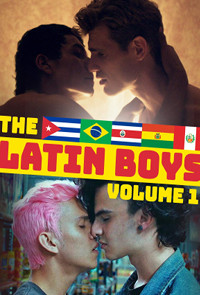| SHADOWS ON THE WALL | REVIEWS | NEWS | FESTIVAL | AWARDS | Q&A | ABOUT | TALKBACK | |||||
 Shadows off the beaten path Shadows off the beaten pathIndies, foreign, docs and shorts...
On this page -
THE LATIN BOYS: | |||||
| See also: SHADOWS FILM FESTIVAL | Last update 17.Apr.20 | |||||
|
The Latin Boys: Volume 1 Reviews by Rich Cline | |||||
 release 20.Dec.19 19/UK NQV 1h45 See also: THE LATIN BOYS: VOL 2 |
 This collection of six short films from five Latin American countries is remarkably unflinching in its raw emotionality. These are darkly moving films that express a wrenching sense of anger at a society that refuses to allow men to be themselves due to oppressively harsh cultures, religion and, above all, machismo. They're also all strikingly well-made, offering a new voice for emerging filmmakers who have something important to say. | ||||
 dir-scr Rodrigo Bellott
dir-scr Rodrigo Bellottwith Doug Porter, Eric Robles, Lorena Sugier, Arturo Lora, Jorge de Lima Flores, Benjamin Lukovski, Matias Betten, Sebastian Borheim 14/Bolivia 30m |
Unicorn Unicornio 
Porter's performance is lovely, vividly catching Isaac's yearning hope as he plans this bold escape to the city and a life in which he can be himself. What follows is warm and honest, lyrically shot and edited to dig beneath the surface. His first visit to a nightclub is a pink-hued voyage of discovery where he catches the eye of the DJ Fernando (Robles), who has his own reason for escaping from his rural family. The film is largely free of dialog, as Isaac's family only speaks German, which marks them as foreign to the locals (as does their horse-drawn wagon). This also means that Isaac and Fernando must communicate without words. Writer-director Bellott quietly observes life on the sun-drenched dairy farm, then later pays the same care in observing Isaac's connection with Fernando. It's a beautiful depiction of the aching loneliness that comes with having to hide yourself from religious fanatics in your own family. So watching Isaac and Fernando find a personal connection is powerfully moving. And where the story goes is deeply haunting. | ||||
 dir-scr Erick Salas Kirchhausen
dir-scr Erick Salas Kirchhausenwith Oscar Meza, Sebastian Rubio 17/Peru 19m |
The Good Friend El Amigo 
The film has a scrappy, rough-hewn charm as these two stoners chat in a way that reveals their warm friendship as well as the usual manly posturing. The cinematography is eye-catching, making terrific use of light and shadows while keeping things gritty and grounded. Rubio and Meza are realistically off-handed as they interact with each other, offering little moments of suggestion that threaten to send this friendship in a whole new direction. This plays out as an amusing dry comedy until some unspoken emotions begin to surface. There's a jagged sense that these feelings have been buried for years by the unspoken rules of society, which hold extra power in a culture so obsessed with machismo. So when the barriers are taken down, what happens has a proper intensity. Especially when the sun rises and things look different in the light of day. | ||||
 dir Simon Jaikiriuma Paetau
dir Simon Jaikiriuma Paetauscr Fabian Suarez, Simon Jaikiriuma Paetau with Yaniel Castillo, Rebecca Aragon, Jaime Reyes, Paula Ali, Nomi, Felipe Reyes, Betsy Padron 11/Cuba 18m |
Mila Caos 
The film is shot with an almost timeless realism in earthy settings that are plainly lived in. Conversations are minimal, with an improvisational feel to them, both within the home and backstage as drag artists discuss feeling disconnected from their families before transforming into fabulous performers on-stage. This is not a side of Havana life that's often seen on-screen, and the film's quiet rhythms are mesmerising. It's a finely observed little film, understated in the way it captures some very deep emotional truths while revelling in the way performance can help a young man let his inner diva shine, even if the person he loves the most remains outside his glow. | ||||
 dir Andres Madrigal
dir Andres Madrigalscr Andres Madrigal, Nacho Rodriguez with Sandra Ribas, Saul Espinazo, Leo Ocampo, David Elizondo 19/Costa Rica 16m |
Pray for Us Ruega por Nosotros 
The film is nicely shot, with a strong sense of tension in the shop and some cleverly crafted TV news reports to update the situation. The three young actors are particularly strong, underplaying their roles while also expressing deeply pent-up frustration. And Ribas offers a vivid sense of emotionality cycling through fear to rage. Where the story goes feels a bit melodramatic, but it's also involving and darkly shocking. And it puts a remarkable spotlight on the hateful nature that eats away at the supposedly devout hearts of people who can't be bothered to understand the plight of someone in need. | ||||
 dir-scr Henrique Arruda
dir-scr Henrique Arrudawith Arlindo Bezerra, Pedro Fasanaro 15/Brazil 16m |
I Am Yet to Make You a Love Song  Ainda Não Lhe Fiz Uma Canção de Amor
There's an open-hearted sense of emotion in this film, which uses a variety of camera techniques to put the audience inside the minds of these two men as they wordlessly stare at each other, letting their feelings wash over them. Filmmaker Arruda approaches each segment like a different style of collage, using editing and colour in a variety of ways to echo the musical genres, sometimes with home-movie graininess, other times in split-screen monochrome. As it continues, the story it tells begins to feel epic, encompassing so many moods within a single relationship, each of them played with striking resonance by Bezerra and Fasanaro, both separately and together. The lingering question is whether you can write a love song before a relationship ends. | ||||
|
A L S O O N The Latin Boys |
 Carlito Leaves Forever Carlito Se Va Para Siempre
Carlito Leaves Forever Carlito Se Va Para Siempredir Quentin Lazzarotto with Carlito Tirira Meshi, Pastor Posho Vie'eja 18/Peru 8m 
Reviewed at BFI Flare 2019
| ||||

See also: SHADOWS FILM FESTIVAL © 2020 by Rich Cline, Shadows
on the Wall
HOME | REVIEWS | NEWS | FESTIVAL | AWARDS
| Q&A | ABOUT | TALKBACK | | ||||
 This powerful half-hour short opens with a breaking news alert about Isaac, a young man in a strict Mennonite community in Eastern Bolivia, who was freed by police from a box his family had locked him in as a punishment. What follows is his true story, artistically dramatised to sensitively explore life within this closed farming community. Isaac (Porter) is the eldest of seven children, so expectations are high. And it's clear he is not happy except when he's playing with his dog. When no one is watching, he sneaks off to read the gay magazine he has buried in a field, and when in town he exchanges glances with the boys. After the incident with the box, officials are keeping an eye on his parents to make sure they stop mistreating him. Then one Saturday, he sneaks out.
This powerful half-hour short opens with a breaking news alert about Isaac, a young man in a strict Mennonite community in Eastern Bolivia, who was freed by police from a box his family had locked him in as a punishment. What follows is his true story, artistically dramatised to sensitively explore life within this closed farming community. Isaac (Porter) is the eldest of seven children, so expectations are high. And it's clear he is not happy except when he's playing with his dog. When no one is watching, he sneaks off to read the gay magazine he has buried in a field, and when in town he exchanges glances with the boys. After the incident with the box, officials are keeping an eye on his parents to make sure they stop mistreating him. Then one Saturday, he sneaks out. On a flat concrete roof, Marcos (Rubio) lounges in the sunshine with his best friend Esteban (Meza). Later, Marcos fobs off his girlfriend so he and Esteban can watch TV and smoke pot, and Marcos confesses that he's no longer turned on by his girlfriend. Teasing Esteban about being gay leads the discussion in unexpected directions, and as Marcos spends the night on the sofa he begins to reach out to Esteban.
On a flat concrete roof, Marcos (Rubio) lounges in the sunshine with his best friend Esteban (Meza). Later, Marcos fobs off his girlfriend so he and Esteban can watch TV and smoke pot, and Marcos confesses that he's no longer turned on by his girlfriend. Teasing Esteban about being gay leads the discussion in unexpected directions, and as Marcos spends the night on the sofa he begins to reach out to Esteban. This Cuban drama has an almost unnerving authenticity about it, taking a documentary approach to storytelling. Rounded up by the cops yet again, a group of drag queens moan about police brutality, hilariously bragging about the officers they've slept with. In the morning, 17-year-old Sebastian (Castillo) is bailed out by his mother (Aragon). She's clearly unimpressed with his antics, but his grandmother offers some colourful camaraderie, including suggestions for him when he next transforms into his wildly colourful alter-ego Mila Caos. Sebastian's one desire is for his mother to take an interest in him, and come see him perform. But she's dealing with her own issues.
This Cuban drama has an almost unnerving authenticity about it, taking a documentary approach to storytelling. Rounded up by the cops yet again, a group of drag queens moan about police brutality, hilariously bragging about the officers they've slept with. In the morning, 17-year-old Sebastian (Castillo) is bailed out by his mother (Aragon). She's clearly unimpressed with his antics, but his grandmother offers some colourful camaraderie, including suggestions for him when he next transforms into his wildly colourful alter-ego Mila Caos. Sebastian's one desire is for his mother to take an interest in him, and come see him perform. But she's dealing with her own issues.  In a corner shop, religious shopkeeper Aurora (Ribas) mutes the TV news so she can read her Bible. But her silent reverie is interrupted by the arrival of three teens (Espinazo, Ocampo and Elizondo) who are on the run. Nervously keeping an eye on the street, pacing the aisles and brandishing a baseball bat, the boys close the door and hole up inside, which naturally rattles Aurora badly. And as it emerges that they've stolen a religious icon, this act of sacrilege incenses her. So when she realises that two of them are a couple, she berates gays as "angry and resentful" criminals, and tells them they need to repent.
In a corner shop, religious shopkeeper Aurora (Ribas) mutes the TV news so she can read her Bible. But her silent reverie is interrupted by the arrival of three teens (Espinazo, Ocampo and Elizondo) who are on the run. Nervously keeping an eye on the street, pacing the aisles and brandishing a baseball bat, the boys close the door and hole up inside, which naturally rattles Aurora badly. And as it emerges that they've stolen a religious icon, this act of sacrilege incenses her. So when she realises that two of them are a couple, she berates gays as "angry and resentful" criminals, and tells them they need to repent. This evocative Brazilian short explores the power of music in life. It's framed as Alessandro and Greg (Bezerra and Fasanaro) lounge in their bedroom silently remembering a variety of musical moments in their relationship, starting with the moment they met. Each sequence reveals an aspect of their connection, from jazz, folk and blues to pop. Along the way, they have a major disagreement when Alessandro discovers Greg has secretly made plans to move to New Orleans to study music.
This evocative Brazilian short explores the power of music in life. It's framed as Alessandro and Greg (Bezerra and Fasanaro) lounge in their bedroom silently remembering a variety of musical moments in their relationship, starting with the moment they met. Each sequence reveals an aspect of their connection, from jazz, folk and blues to pop. Along the way, they have a major disagreement when Alessandro discovers Greg has secretly made plans to move to New Orleans to study music.